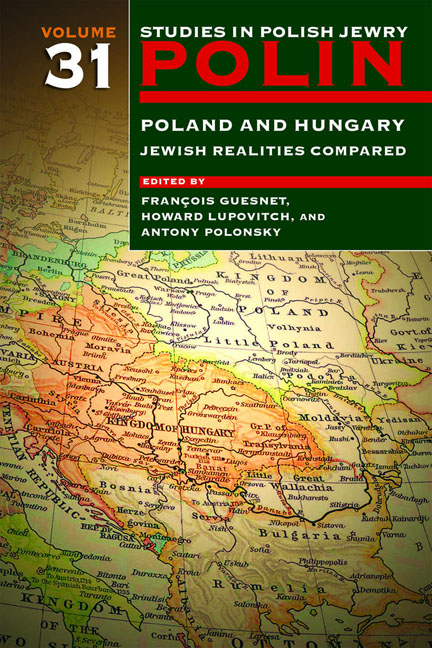Book contents
- Frontmatter
- Dedication
- Editors and Advisers
- Preface
- Polin
- Polin: Studies in Polish Jewry
- Contents
- Note on Place Names
- Note on Transliteration
- Part I POLAND AND HUNGARY: JEWISH REALITIES COMPARED
- JEWISH ACCULTURATION AND INTEGRATION
- JEWISH RELIGIOUS LIFE
- JEWS IN POPULAR CULTURE
- THE INTERWAR YEARS
- THE HOLOCAUST AND ITS AFTERMATH
- PERSONAL REFLECTIONS
- Part II NEW VIEWS
- Part III OBITUARIES
- Notes on the Contributors
- Index
Ben-Zion Gold: 26 July 1923‒20 April 2016
- Frontmatter
- Dedication
- Editors and Advisers
- Preface
- Polin
- Polin: Studies in Polish Jewry
- Contents
- Note on Place Names
- Note on Transliteration
- Part I POLAND AND HUNGARY: JEWISH REALITIES COMPARED
- JEWISH ACCULTURATION AND INTEGRATION
- JEWISH RELIGIOUS LIFE
- JEWS IN POPULAR CULTURE
- THE INTERWAR YEARS
- THE HOLOCAUST AND ITS AFTERMATH
- PERSONAL REFLECTIONS
- Part II NEW VIEWS
- Part III OBITUARIES
- Notes on the Contributors
- Index
Summary
BEN-ZION GOLD, a long-time member of the Board of the American Association of Polish Jewish Studies who died on 20 April 2016, was director of Harvard Hillel from 1958 until he retired in 1990. He grew up in a traditional religious Jewish family in Radom in central Poland and described his childhood in a beautifully written and moving memoir, The Life of Jews in Poland before the Holocaust (2007) which was translated into Polish as Cisza przed burzą: Życie polskich Żydów przed Holokaustem (2011). In it he related his experiences as a student in a number of yeshivas, most notably in the preparatory programme of the Yeshiva Hakhmei Lublin which had opened just a few years earlier in 1930 in the imposing building which still stands and has been returned to the Jewish community of Poland. His parents, three sisters, and brother were murdered in the Holocaust. Ben-Zion attributed his survival to his religious faith and claimed that his experiences in German concentration camps ‘deepened [his] attachment to Judaism [and] strengthened [him] in [his] devotion to [his] heritage’. But he was also well aware that the world of unquestioning faith in which he had been brought up could not be recreated after the Nazis’ devastating revelation of what humanity was capable of. As he put it:
Sometimes when I visit Meah Shearim, the quarter of ultra Orthodox Jews in Jerusalem, I feel as though I had returned to the scenes of my childhood. Many things about them are reminiscent of the life of religious Jews in Poland: they speak Yiddish, their children go to ḥeder and yeshiva the way I did, even the foods served in their restaurants are similar. But it is only an illusion. For all of the similarity in language and way of life there is a significant difference. The resemblance is like that of a sect that is dedicated to the preservation of a way of life that no longer exists.
Throughout his life he continued, in his words, to wrestle with these ‘problems of faith’ but also attempted to remain true to ‘the Jewish tradition in which [he] had grown up at home, studied in ḥeder, and at the yeshiva’.
- Type
- Chapter
- Information
- Polin: Studies in Polish Jewry Volume 31Poland and Hungary: Jewish Realities Compared, pp. 545 - 547Publisher: Liverpool University PressPrint publication year: 2018



